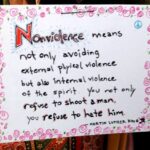… and if indeed sometimes I happen to tell the truth, I hide it among so many lies that it is hard to find. – Niccolò Machiavelli
What does that mean?
This is a twitter friendly version of a longer quote: “For a long time I have not said what I believed nor do I ever believe what I say, and if indeed sometimes I do happen to tell the truth, I hide it among so many lies that it is hard to find.” (from a letter to Francesco Vettori)
I’m not an expert on Machiavelli, but I have seen some indications that this quote is believed to be a bit sarcastic. But what if he was not, what if this quote is the truth, and so much of what else he said was laced with lies and deception?
How is the average person to tell the difference between what are lies and what is the truth? And not just from the quote’s author (as he is both dead and not saying any new lies at the moment), but from the people all around us, who might or might not be telling us the truth?
Why is verifying what you are told important?
Really, how safe is it to trust every word out of the mouth of every person you meet, all day, every day? Given the state of the world today, that probably wouldn’t be too bright, would it? To me, that’s one thing we can learn from this quote.
To me, the most important conclusion I draw from this quote is that trust is a fragile thing. I try to trust, but I also try to verify. Not everyone tells the whole truth the whole time. We all are tempted to lie from time to time. Sometimes, even the best of us give in to that temptation.
What would you do if someone said they needed a little help to get at some money, and your share would be huge, if you just gave them some cash up front? How likely is that to end well for you? However, if you could manage to get independent, trustworthy, confirmation, that might be different, right?
Where can I apply this in my life?
Have you ever received an e-mail from a Nigerian Oil Barron or Prince? If you didn’t have some kind of spam filter, how much of your mail would be flat-out lies and scams? What about your phone, and the phone calls you get? How many are for charities you never heard of before?
Would you trust a mechanic that you knew nothing about if they said you needed a new engine or some other extraordinarily expensive part for your car? What about a contractor that knocked on your door, explaining that as he was driving by to give an estimate to someone the next block over, they noticed your house needed a critical repair?
In each of these cases, they might be telling the truth. They also might be interested only in separating your cash from your wallet. How do you know if you can trust them? To me, that is where the verification of the person in question comes in.
Do you know anyone who has ever had dealings with this person? Do they have references? But even those could be faked. They could do a good job for a few people, and use them as references, then start doing sloppy work and cutting corners to get as much of your cash as they possibly can manage.
Besides checking with your social networks and their specific references, what else can you do? In these days of the internet, there are tons of ways to check on people and the kind of work they do. In the US, we have the Better Business Bureau, among many other professional, trade, and business sites to help with the verifying of a company or person.
What you can do, what you should do, will vary depending on what you stand to lose if what you are told isn’t exactly what you were expecting. If it’s a couple bucks for a homeless person, what’s the down side? Is it worth trying to get their name, then do an investigation to find out if they’re really homeless? I would think not.
It might be different if a Nigerian Oil Baron or Prince wanted a couple thousand dollars, right? There, the potential cost can be rather high, and it might be worth making sure things are legit before you lose that much of your hard earned money.
However, the same can be said about time, effort, emotion or whatever else they might be asking of you. Like so much of life, there is a Golden Mean between the extremes of being naive and being paranoid. Greater risk implies greater effort in verification. It’s up to you to find your path, based on your willingness to take risk, and to suffer loss.
There are many people out there who exist primarily to separate you from your money or other things you hold valuable. Most will tell you whatever they think you want to hear to get you to do their biding. What will you do to verify the truth of their words and the integrity of their actions?
From: Twitter, @INeedADolla
confirmed at : http://www.wisdomsupreme.com/dictionary/niccolo-machiavelli.php 3rd from bottom
Photo by malczyk








That was embarrassing. Somehow, I forgot to add the picture. Fixed it, but still wondering…